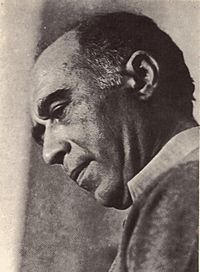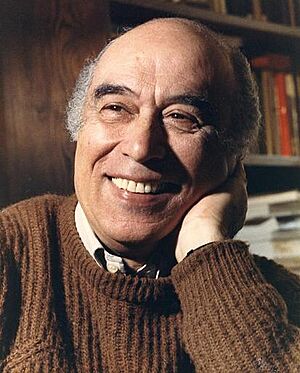Fernando Namora facts for kids
Quick facts for kids
Fernando Namora
|
|
|---|---|

Namora in 1966
|
|
| Born | 15 April 1919 Condeixa-a-Nova |
| Died | January 31, 1989 (aged 69) Lisbon |
| Occupation | medical doctor, writer |
| Nationality | Portuguese |
| Period | 1937-1988 |
| Genre | Literature |
| Subject | poetry, romance and essayism |
| Literary movement | Neorealism and Contemporary Fiction |
| Signature | |
Fernando Namora (born April 15, 1919 – died January 31, 1989) was a famous Portuguese writer and medical doctor. His full name was Fernando Gonçalves Namora. He was born in Condeixa-a-Nova, a town in the Coimbra District, and later passed away in Lisbon, Portugal.
Contents
Fernando Namora: Doctor and Writer
Fernando Namora earned his medical degree in 1942 from the University of Coimbra. His time as a student greatly influenced him. His experiences as a country doctor in remote areas like Beira Baixa and Alentejo also shaped his views. He worked in these regions until 1950. After that, he moved to Lisbon to work as a medical assistant. He joined the Instituto Português de Oncologia, a cancer institute.
Early Books and Literary Start
Fernando Namora started writing at a young age. His first book, Relevos, was a collection of poems. He published it in 1937 when he was just 18 years old. In 1938, his first novel, As Sete Partidas do Mundo, was released. This book won the Almeida Garrett Prize.
Three years later, in 1941, he worked with other writers in Coimbra. They created a literary project called Novo Cancioneiro. This project had 10 volumes. His poem, Terra, was the first one published in this collection. Many experts believe this poem marked the beginning of the Neorealism movement in Portuguese literature. This was a very important moment for writing in Portugal.
Exploring Different Writing Styles
Fernando Namora wrote over 30 books during his 50-year career. He didn't just write "neo-realistic" novels. These novels often showed the lives of ordinary people. Examples include Casa da Malta (1945) and Retalhos da Vida de um Médico (1949 and 1963).
He also wrote about "urban themes" and modern life. These books explored stories set in cities. Some of these include O Homem Disfarçado (1957) and Domingo à Tarde (1961). Domingo à Tarde won the José Lins do Rego Prize. Later, he wrote O Rio Triste (1982), which won several awards.
Another type of writing he did was called cadernos de um escritor (writer's notebooks). These were like personal journals. They shared his thoughts and observations about society. These books often talked about changes happening in the 1960s and 1970s. He wrote these after attending international meetings and traveling to places like Scandinavia.
Recognition and Awards
Fernando Namora was a highly respected writer. In 1981, he was even suggested for the Nobel Prize. This shows how important his work was in the world of literature.
Works
- As Sete Partidas do Mundo, novel – 1938
- Fogo na Noite Escura, novel – 1943
- Casa da Malta, novel – 1945
- Minas de San Francisco, novel – 1946
- Retalhos da Vida de um Médico, narratives / first part – 1949
- A Noite e a Madrugada, novel – 1950
- Deuses e Demónios da Medicina, biographies – 1952
- O Trigo e o Joio, novel – 1954
- O Homem Disfarçado, novel – 1957
- Cidade Solitária, narrative – 1959
- As Frias Madrugadas, poems – 1959
- Domingo à Tarde, novel – 1961
- Retalhos da Vida de um Médico, narratives / second part – 1963
- Diálogo em Setembro, romanced chronicle – 1966
- Um Sino na Montanha, writer's notebooks – 1968
- Marketing, poetry – 1969
- Os Adoradores do Sol, writer's notebooks – 1971
- Os Clandestinos, novel – 1972
- Estamos no Vento, literary-sociologic narrative – 1974
- A Nave de Pedra, writer's notebooks – 1975
- Cavalgada Cinzenta, narrative – 1977
- Encontros, interviews – 1979
- Resposta a Matilde, divertimento – 1980
- O Rio Triste, novel – 1982
- Nome para uma Casa, poems – 1984
- URSS mal amada, bem amada, chronicle – 1986
- Sentados na Relva, writer's notebooks – 1986
- Jornal sem Data, writer's notebooks – 1988
See also
 In Spanish: Fernando Namora para niños
In Spanish: Fernando Namora para niños


